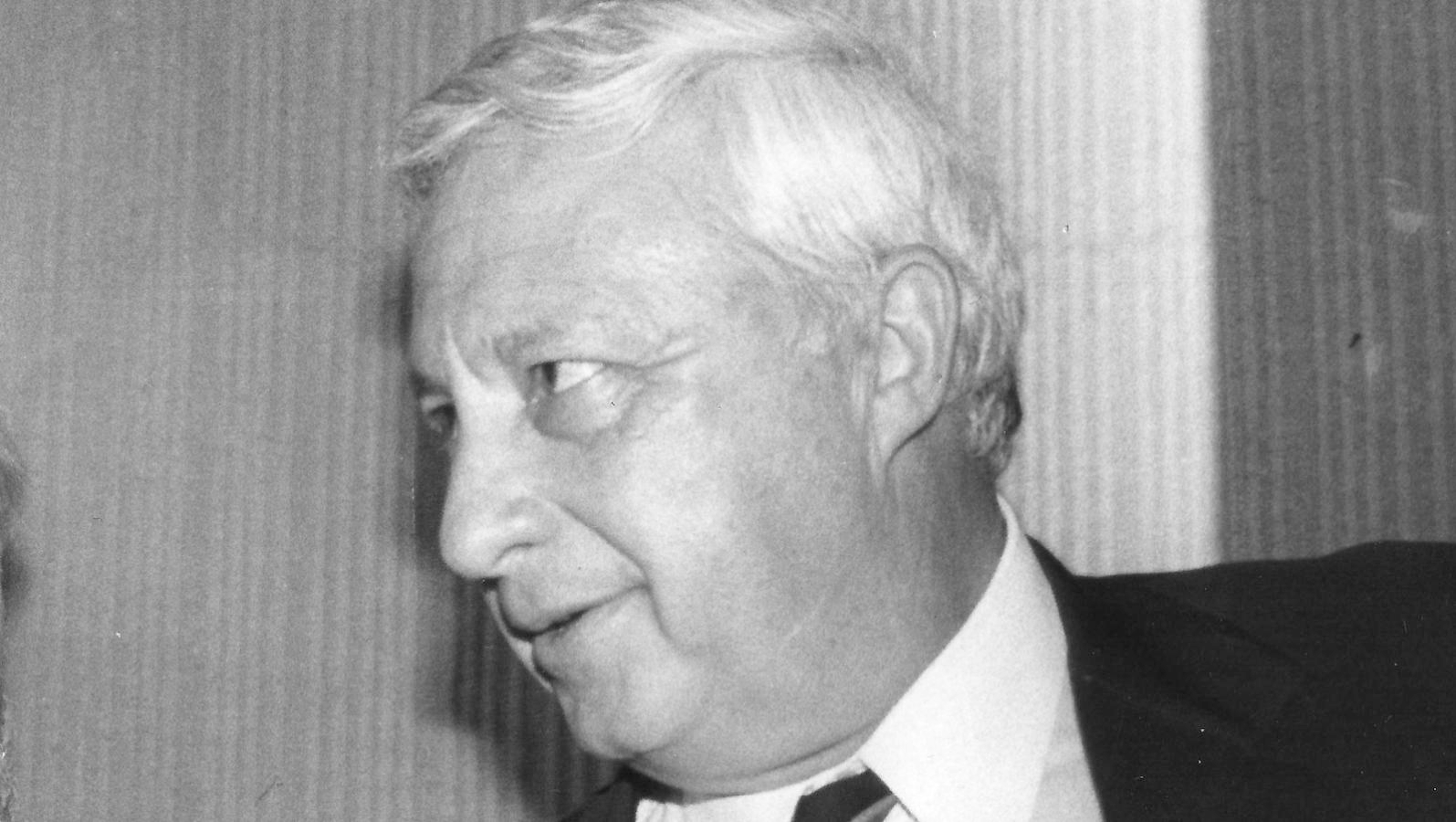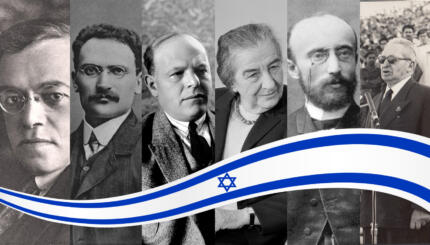Ariel Sharon was born Ariel Scheinermann in Kfar Malal, mandatory Palestine, on February 27, 1928 and died on January 11, 2014. He joined the Haganah underground at the age of 14 in 1942 (1947 according to some sources).
Read Ariel Sharon’s obituary here.
View a timeline of Ariel Sharon’s life here.
A Young Soldier
During the 1948 War of Independence, Sharon commanded an infantry company in the Alexandroni Brigade and distinguished himself in fighting in Jerusalem and elsewhere. He was wounded in one of the battles of Latrun. Sharon was appointed Central Command and North Command intelligence officer in 1951-52. He then went to study in the Hebrew University, but his studies were interrupted in 1953 when he was recalled to found and lead the “101” special commando unit which carried out retaliatory operations. Sharon and 101 were responsible for an infamous bloody raid in Qibieh, in October 1953, in which 69 civilians were killed. The raid was a reprisal for a terror attack on Tirat Yehuda. Sharon and others have since claimed that they did not know civilians were being killed, but in an Israeli television documentary, Sharon said the raid was necessary and he would do it again.

Help us keep Jewish knowledge accessible to millions of people around the world.
Your donation to My Jewish Learning fuels endless journeys of Jewish discovery. With your help, My Jewish Learning can continue to provide nonstop opportunities for learning, connection and growth.
Sharon was made commander of the paratroop brigade (“Hativat Tzanchanim”) in 1956 and helped to establish its tactics and reputation. In the Sinai Campaign he led a controversial operation against orders to conquer the Mitla Pass. In 1957 he was sent by the IDF to study at the Camberley Staff College in Great Britain.
In 1958 Sharon became an Infantry Brigade Commander and later was made commander of the IDF infantry training school. He then studied law at Tel Aviv University and received an LLD degree. Sharon became Chief of Staff of the Northern Command in 1964 and Head of the Army Training Department in 1966. He fought in the 1967 Six Day War as commander of an armored division. In 1969 he was appointed Head of the Southern Command Staff.
Sharon resigned from the army in June 1972. He was recalled to active military service in the 1973 War to command an armored division. He became involved in a controversy over the crossing of the Suez Canal. According to some versions of the war, Sharon’s action allowed the IDF to surround the Egyptian Third Army and end the war in a superior tactical position. Others claim that his disobedience and recklessness cost many lives needlessly.
Birth of a Politician
Ariel Sharon was elected to the in December 1973 on the right-wing Gahal ticket. However, he resigned a year later and served as Security Adviser to Prime Minister Rabin (1975). He was elected to the Knesset in 1977 on the Shlomzion ticket. Following the elections, he helped organize and joined the right-wing Likud party and was appointed Minister of Agriculture in Menachem Begin’s first government (1977-81). During the peace negotiations with Egypt, Sharon persuaded Menachem Begin to agree to remove the settlements in Sinai in order to obtain peace with Egypt. One of his priorities was to pursue agricultural cooperation with Egypt, but his major priority was expansion of Israeli settlement activity in the West Bank and Gaza, often circumventing legal channels to found and support new settlements.
In 1981 Ariel Sharon was appointed Defense Minister. He was the architect of the 1982 Lebanon War. The war brought about the destruction of the PLO terrorist infrastructure in Lebanon and forced the PLO and Yasser Arafat into exile in Tunis. However, the war was very unpopular in Israel and abroad because of needless loss of life in operations such as the assault on the Beaufort and the disastrous massacre of at least 700 Palestinians in the Sabra and Shatila refugee camps by Christian militia.
Sharon was indicted by the Kahan commission for failing to foresee the possibility of a massacre and failing to intervene after the massacre was underway. In 1983, Sharon resigned as Defense Minister after a government commission found him indirectly responsible for the September 1982 massacre. The war in Lebanon and the Qibieh and Sabra and Shatila massacres gave Sharon the reputation of a hated super-hawk in much of the Arab world.
Sharon remained in the government as a minister without portfolio until 1984. He served as Minister of Industry and Trade from 1984-90. In this capacity, he concluded the Free Trade Agreement with the US in 1985. From 1990-1992, Sharon served as Minister of Construction and Housing and Chairman of the Ministerial Committee on Immigration and Absorption. Sharon was opposed to the Oslo peace accords with the Palestinians and sought ways to undermine it.
Becoming Prime Minister
In 1998, Ariel Sharon was appointed Foreign Minister and headed the permanent status negotiations with the Palestinian Authority. He participated in the Wye River negotiations. While serving as Foreign Minister, Sharon met with US, European, Palestinian, and Arab leaders to advance the peace process. At the same time, he sought to accelerate the building of settlements in the West Bank.
After the election of Ehud Barak as Prime Minister in May 1999, Ariel Sharon became interim Likud party leader following the resignation of Benjamin Netanyahu. In September 1999, he was elected Chairman of the Likud. He also served as a member of the Foreign Affairs and Defense Committee in the Knesset. Sharon insisted on visiting the Temple Mount Haram al-Sharif compound in September of 2001. His visit triggered, or served as the excuse for, a wave of violence that put an end, in practical terms, to the Oslo peace process and brought about the fall of his rival, Ehud Barak.
In a special election held on February 6, 2001, Ariel Sharon was elected Prime Minister, decisively defeating Ehud Barak. He presented his government to the Knesset on March 7, 2001. He pursued an uncompromising line against Palestinian terror groups and Yasser Arafat, and insisted that Arafat was an obstacle to peace and personally responsible for much of the violence of the Intifada. However, Sharon did not carry out the extreme programs of hawks or vindicate predictions of anti-Zionists that he would commit genocide against the Palestinians. Sharon’s stand against terrorism received more support from the US and European countries following the World Trade Center bombings in September 2001.
Sharon in Office
During the first years of Sharon’s administration, Palestinian terror attacks increased and diplomatic initiatives were stalled. Sharon was able to form a close and effective alliance with the United States based on common interests in fighting terror and tacit Israeli support for the US war in Iraq. After a spate of terror attacks left 140 dead in March of 2002, Sharon ordered Operation Defensive Wall in the West Bank. From the beginning of the operation, Palestinian leader Yasser Arafat, who Sharon seemed to regard as his personal nemesis, remained besieged and neutralized in his Muqata compound in Ramallah until October, 2004, when he was allowed to leave for medical treatment.
At about the same time, Sharon accepted or helped initiate the Road Map peace initiative that effectively replaced the Oslo peace process with a staged, performance-based plan for peace. The Road Map seemed to develop into a dead letter because neither side was willing to fulfill its commitments. Sharon had promised to remove illegal settlement outposts, but in fact, as late as January 2006, very few of the outposts had been eliminated. Renewed impetus to the peace process was given following the death of Yasser Arafat and the election of Mahmoud Abbas to the Palestinian presidency.
In elections held January 28, 2003, Sharon’s Likud party won 40 seats, defeating Labor Party candidate Amram Mitzna, who called for unilateral disengagement–withdrawal from Palestinian areas and construction of a defensive barrier to fend off terror attacks.
An IDF campaign targeting suicide bombings gradually became effective in foiling about 90% of the attacks. Targeted assassinations killed major terrorist leaders including Ahmed Yassin and Abdul-Aziz Rantissi, heads of Hamas.
By 2004, it was evident that the IDF, under Sharon’s direction, had managed to stem the wave of terror, but the diplomatic stalemate continued. Sharon also came to adopt much of the platform of the Labor party he had defeated. He began construction of a controversial security barrier along Israel’s borders. The route of the wall had to be changed time and again because it had included large areas beyond the 1949 armistice lines that infringed on Palestinian territory.
In December 2003, Ariel Sharon seemed to do an abrupt about face, adopting major portions of the plan developed by Ehud Barak and Amram Mitzna and announcing his own Gaza disengagement plan, which eventually won the support of the Bush administration. The plan faced enormous opposition from Sharon’s own Likud party and threatened to dissolve the political unity of the Israeli right. Nonetheless, on October 26, 2004, the Knesset passed the plan in what was viewed as a major political triumph for Sharon.
Cooperation with Palestinian Prime Minister Mahmoud Abbas, as well as the disengagement plan, drew increasingly vocal criticism from right wing extremists, formerly Sharon’s greatest supporters. Formerly viewed as an archfiend by Arabs and the Israeli left, Sharon now became the target of vilification, including death threats, by the right. The election of Amir Peretz to head the Israel Labor party precipitated early elections.
On November 21, 2005, Sharon announced that he was withdrawing from the Likud to found a new party, “National Responsibility,” later renamed the Kadima Party, (meaning “forward.”) Sharon’s new party was slated to win a decisive victory according to pollsters. However, after suffering a minor cerebrovascular accident, Sharon suffered a massive hemorrhagic stroke on January 4, 2006, leaving the Israeli political scene in an upheaval. He lived in a state of minimal consciousness for the last eight years of his life.
During Sharon’s time in office, several investigations produced evidence of enormous corruption in Sharon’s political and business dealings and those of his sons, including bribes of hundreds of thousands of dollars, but these rumors and reports were only a minor determinant of Sharon’s status in the eyes of the Israeli public and the world. No legal actions were brought against Sharon.
Ariel Sharon was twice widowed. His first wife, Margalit, was killed in an automobile accident. His second wife, Lily, died of lung cancer in 2000. He had two surviving sons, Omri and Gilad. A third son, Gur, died in 1967.
This abridged biography is copyrighted by and reprinted with permission of MidEastWeb for Coexistence, RA.



